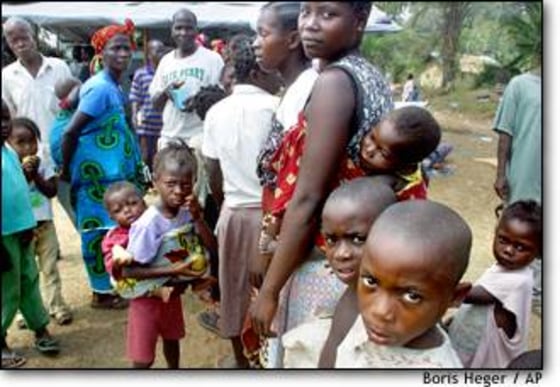Their plates heaped with steaming rice and peanut sauce, the taxicab and livery drivers loudly debate the crisis. Printouts from French-language Reuters stories and French newspapers are handed around as they dissect the latest developments. While U.S. newspapers may be obsessed with war in Iraq and the travails of Trent Lott, these men are focused on the growing crisis in the West African nation of Ivory Coast.
The Ivoire restaurant on 119th Street in Manhattan is a popular stopoff for the city’s West African immigrants. “The country is ruined,” is a frequent refrain, referring to the cocoa- and coffee-rich nation that was one of the success stories of West Africa.
Ivory Coast’s war erupted with a failed coup attempt Sept. 19 and quickly saw rebels seize the northern half of the country, their main support base. Rebels are angered by what they say is minority persecution by President Laurent Gbagbo’s southern-based government.
West African leaders’ attempts to broker peace was eclipsed by fighting in the west in recent weeks — including the battle for Man, a key city in the nation’s coffee-production, located 50 miles west of the border with Liberia.
Last week, after government soldiers fled the city, French Foreign Legion troops moved in force toward the rebels. Soldiers from the former colonial ruler opened fire on the insurgents to block an advance over the weekend. In response, three rebel factions discussed forming an alliance on Monday and warned that French attacks would be met by a full-blown offensive.
WATCHING THE NEWS
In New York, home to 10,000 of the estimated 30,000 Ivorians in the United States, the developments on the African continent are bleak.
“We are very busy at night when a lot of people come to watch the evening news from France and the BBC,” waitress Alimate Traore said.
For Daogounde Sinally, an Ivorian who has lived in this country since 1989, the biggest worry is the fate of his family in Bouake, Ivory Coast’s second-largest city which has been paralyzed since it was captured by rebels in late September.
According to Sinally there is no work and little food for his family and he’s distressed that there is absolutely no way he can go home any time soon.
He is consoled by the fact that he has managed to contact family and friends by phone in Abidjan, the commercial capital and major port city in Ivory Coast that has remained largely unscathed by the civil war raging up north.
Sinally has also found a way to send money home via a friend who works for the International Red Cross in Abidjan.
Adama Kone, a friend of Sinally’s and a driver for the livery car company called “Ivoire Car” is more optimistic. “Everything will go along. We hope everything will be OK.”
But as a native of the northern city of Odijienne, Kone is dismayed over the perception that the northerners are the aggressors in the crisis.
As another patron unrolled a prayer mat in the corner of the restaurant, he said blame should be shared. “People think this is a problem only in our part of the country, but that is not so. It is a problem for the whole country.”
FRANCE’S ROLE
Many Ivorians are deeply suspicious of the role of France, the nation’s former colonial ruler.
“France is ruining the Ivory Coast! They are killing our families. The military killed men and then threw them in a pile. They’ve ruined the country! It’s no good!” said Mory Kante, the owner of a record shop on 116th Street.
Kante was referring to the recent discovery in Man of a mass grave. Both sides blamed the other for the apparent massacre.
But Kante and many other Ivorians see France’s military invention to bolster the government solely as a bid to secure their own cocoa and coffee resources, while paying little heed to the human cost.
In October, New York’s Ivorian community held a march outside the United Nations to raise awareness of the problems in their native land.
Bamba Franck, a spokesman for the Ivory Coast Embassy in Washington, D.C., said the ambassador has gone on a speaking tour to explain the issues to American students while the embassy has established a website to raise money for relief efforts.
At the Motherland Hair Braiding shop on 125th Street, the concerns are more mundane. Working to the beat of West African music, Bamba Ami and Cisse Mariame are more interested in getting more customers in the door.
“The men have time to listen to the TV at night to get the news and can sit around and talk about the problems back home. “For us it’s just work, work, work,” Ami said.
“I have two kids back in Abidjan, I just want to make money here and go back home.”
(Petra Cahill is an assignment editor for NBC News.)
